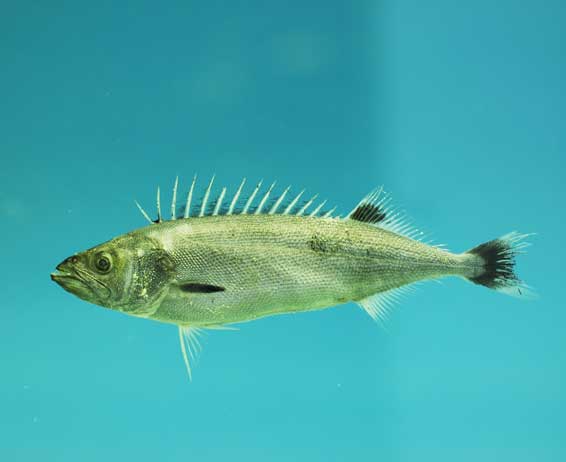Ruvettus pretiosus (SEFSC Pascagoula Laboratory; Collection of Brandi Noble, NOAA/NMFS/SEFSC ) Cladus: Eukaryota The oilfish, Ruvettus pretiosus, is a species of snake mackerel in the family Gempylidae, and the only species in the genus Ruvettus. It is found in the Mediterranean, middle Atlantic and throughout the southern seas, at depths between 100 and 800 m. Its length is between 80 cm and 2 m. The flesh is very oily and although edible, the oil actually consists of wax esters, which are not digested like traditional oil. The flesh has an oil content of around 25%, and with serving sizes of several ounces and upwards commonplace, some people experience a laxative side effect from such a large amount of wax esters. Oilfish is pleasantly rich in taste and can be substantially cheaper than some other fish species, leading to some fish sellers to intentionally mislabel it as butterfish or even codfish, despite the utter lack of relation. This leads the consumer to often eat large servings, as they assume it is a fish with which they are familiar, and then some may experience a laxative effect. Because of this, Japan and Italy have imposed an import ban on oilfish, and Australia has banned oilfish from being sold as food. The US FDA has warned consumers about potential mislabeling of oilfish, but has concluded any laxative side effects that occur are uncomfortable at worst and pose no health risk. Hong Kong's ParknShop supermarket was selling oilfish as "cod fish (oilfish)" in its stores. Consumers ate the fish, believing it to be codfish, then suffered oily diarrhea (keriorrhea) as a result. The oilfish-labelling controversy was reported by a number of news and media organizations, such as TVB Newsmagazine. A total of 14 complaints were filed against the supermarket chain, leading to an investigation by the Centre for Food Safety. ParkNShop has denied responsibility, claiming the fish is safe for human consumption. Nonetheless, the chain has since stopped selling the fish product.[1][2][3] On 30 January 2007, the commercial attache from the Indonesian consulate in Hong Kong confirmed the export health certificate Mr Peter Johnston, ParkNShop's Quality Food Safety and Regulatory Affairs General Manager, had used in its media conference several days earlier, was doctored. The attache explained its fisheries department, under a request from the Hong Kong importer, had changed the product name, by including "Cod Fish" alongside its scientific name, on the certificate. As a result of the PARKnSHOP-oilfish incident, Centre for Food Safety in Hong Kong published new guidelines on the proper labelling of oilfish to consumers, such that oilfish species Ruvettus pretiosus and Lepidocybium flavobrunneum should not be labelled as "cod". [4][5] ParknShop was also fined HKD 45,000 after pleading guilty to 9 counts of misrepresentation of products.[6] The Canadian Broadcasting Corporation reported (Feb. 23, 2007) on several cases in Canada where mislabelled oilfish was sold at Chinese supermarkets.[7][8][9][10][11] References ^ Froese, Rainer, and Daniel Pauly, eds. (2006). "Ruvettus pretiosus" in FishBase. February 2006 version.
Source: Wikipedia, Wikispecies: All text is available under the terms of the GNU Free Documentation License |
|

